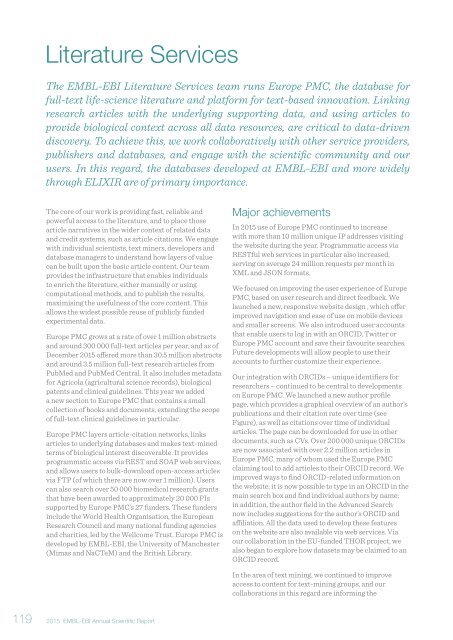Annual Scientific Report 2015
EMBL_EBI_ASR_2015_DigitalEdition
EMBL_EBI_ASR_2015_DigitalEdition
You also want an ePaper? Increase the reach of your titles
YUMPU automatically turns print PDFs into web optimized ePapers that Google loves.
Literature Services<br />
The EMBL-EBI Literature Services team runs Europe PMC, the database for<br />
full-text life-science literature and platform for text-based innovation. Linking<br />
research articles with the underlying supporting data, and using articles to<br />
provide biological context across all data resources, are critical to data-driven<br />
discovery. To achieve this, we work collaboratively with other service providers,<br />
publishers and databases, and engage with the scientific community and our<br />
users. In this regard, the databases developed at EMBL-EBI and more widely<br />
through ELIXIR are of primary importance.<br />
The core of our work is providing fast, reliable and<br />
powerful access to the literature, and to place those<br />
article narratives in the wider context of related data<br />
and credit systems, such as article citations. We engage<br />
with individual scientists, text miners, developers and<br />
database managers to understand how layers of value<br />
can be built upon the basic article content. Our team<br />
provides the infrastructure that enables individuals<br />
to enrich the literature, either manually or using<br />
computational methods, and to publish the results,<br />
maximising the usefulness of the core content. This<br />
allows the widest possible reuse of publicly funded<br />
experimental data.<br />
Europe PMC grows at a rate of over 1 million abstracts<br />
and around 300 000 full-text articles per year, and as of<br />
December <strong>2015</strong> offered more than 30.5 million abstracts<br />
and around 3.5 million full-text research articles from<br />
PubMed and PubMed Central. It also includes metadata<br />
for Agricola (agricultural science records), biological<br />
patents and clinical guidelines. This year we added<br />
a new section to Europe PMC that contains a small<br />
collection of books and documents, extending the scope<br />
of full-text clinical guidelines in particular.<br />
Europe PMC layers article-citation networks, links<br />
articles to underlying databases and makes text-mined<br />
terms of biological interest discoverable. It provides<br />
programmatic access via REST and SOAP web services,<br />
and allows users to bulk-download open-access articles<br />
via FTP (of which there are now over 1 million). Users<br />
can also search over 50 000 biomedical research grants<br />
that have been awarded to approximately 20 000 PIs<br />
supported by Europe PMC’s 27 funders. These funders<br />
include the World Health Organisation, the European<br />
Research Council and many national funding agencies<br />
and charities, led by the Wellcome Trust. Europe PMC is<br />
developed by EMBL-EBI, the University of Manchester<br />
(Mimas and NaCTeM) and the British Library.<br />
Major achievements<br />
In <strong>2015</strong> use of Europe PMC continued to increase<br />
with more than 10 million unique IP addresses visiting<br />
the website during the year. Programmatic access via<br />
RESTful web services in particular also increased,<br />
serving on average 24 million requests per month in<br />
XML and JSON formats.<br />
We focused on improving the user experience of Europe<br />
PMC, based on user research and direct feedback. We<br />
launched a new, responsive website design , which offer<br />
improved navigation and ease of use on mobile devices<br />
and smaller screens. We also introduced user accounts<br />
that enable users to log in with an ORCID, Twitter or<br />
Europe PMC account and save their favourite searches.<br />
Future developments will allow people to use their<br />
accounts to further customize their experience.<br />
Our integration with ORCIDs – unique identifiers for<br />
researchers – continued to be central to developments<br />
on Europe PMC. We launched a new author profile<br />
page, which provides a graphical overview of an author’s<br />
publications and their citation rate over time (see<br />
Figure), as well as citations over time of individual<br />
articles. The page can be downloaded for use in other<br />
documents, such as CVs. Over 200 000 unique ORCIDs<br />
are now associated with over 2.2 million articles in<br />
Europe PMC, many of whom used the Europe PMC<br />
claiming tool to add articles to their ORCID record. We<br />
improved ways to find ORCID-related information on<br />
the website: it is now possible to type in an ORCID in the<br />
main search box and find individual authors by name;<br />
in addition, the author field in the Advanced Search<br />
now includes suggestions for the author’s ORCID and<br />
affiliation. All the data used to develop these features<br />
on the website are also available via web services. Via<br />
our collaboration in the EU-funded THOR project, we<br />
also began to explore how datasets may be claimed to an<br />
ORCID record.<br />
In the area of text mining, we continued to improve<br />
access to content for text-mining groups, and our<br />
collaborations in this regard are informing the<br />
119<br />
<strong>2015</strong> EMBL-EBI <strong>Annual</strong> <strong>Scientific</strong> <strong>Report</strong>


